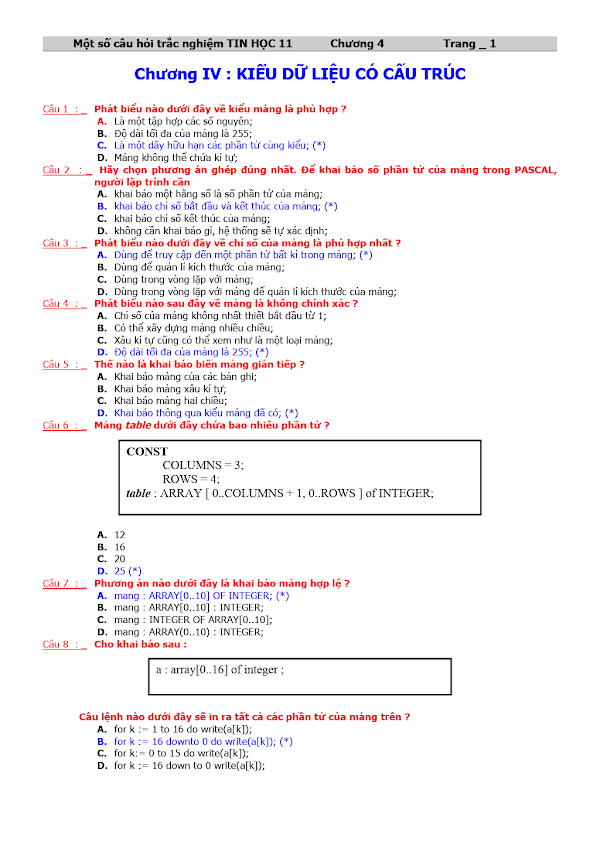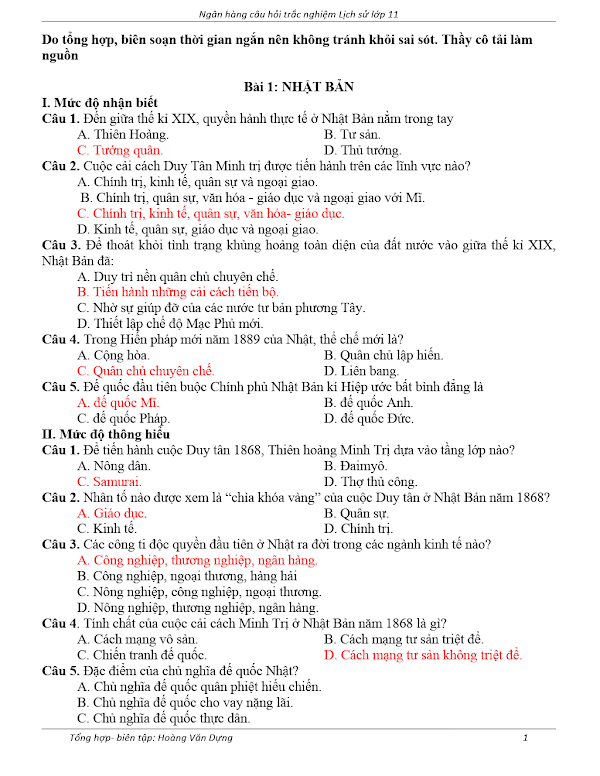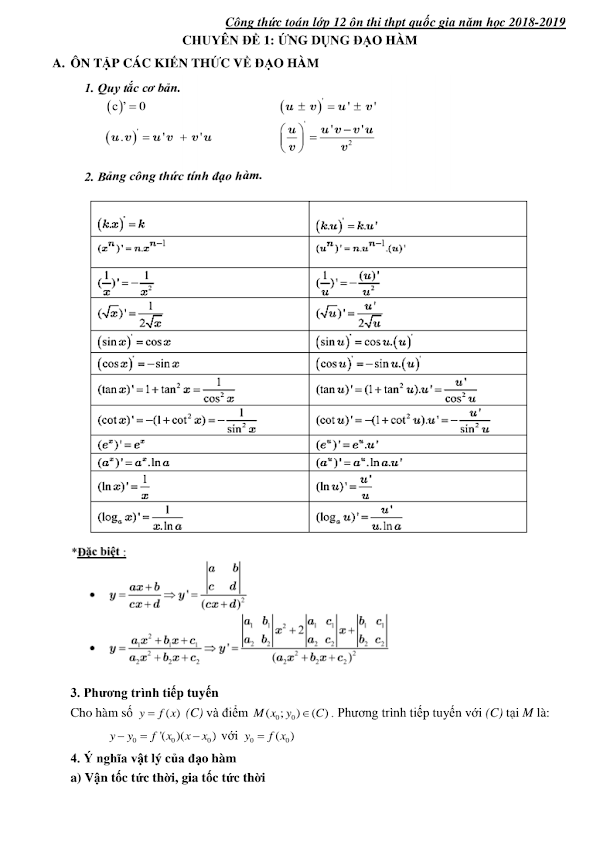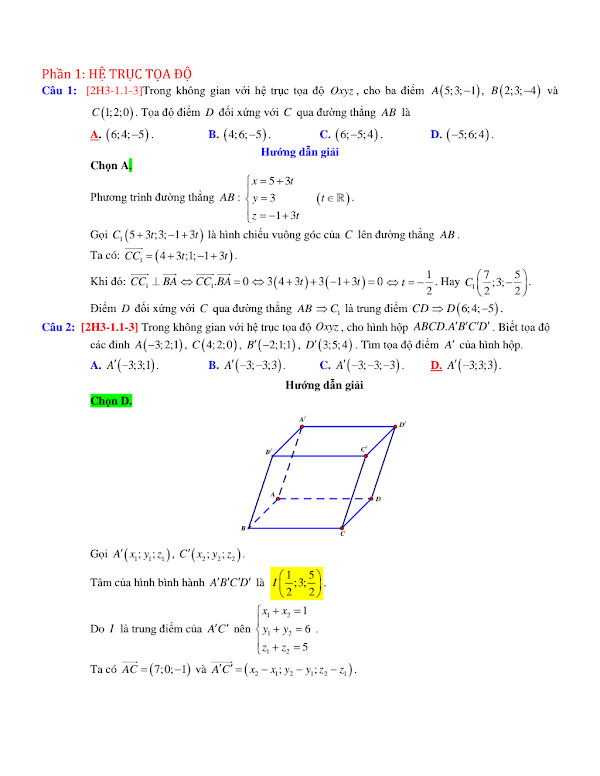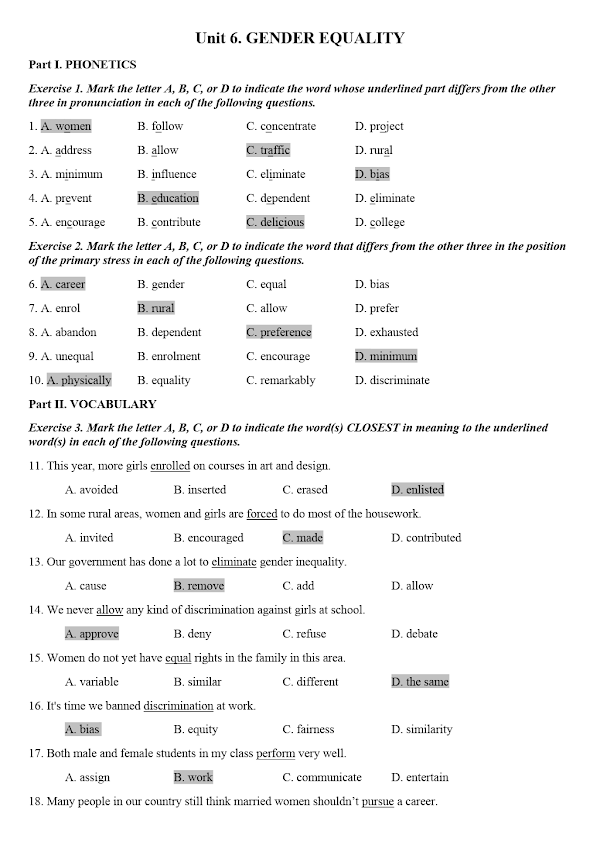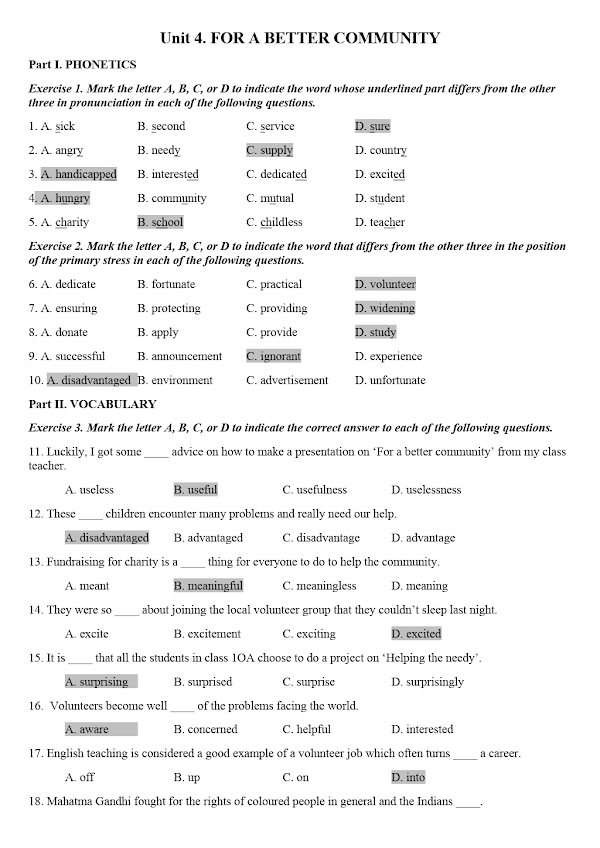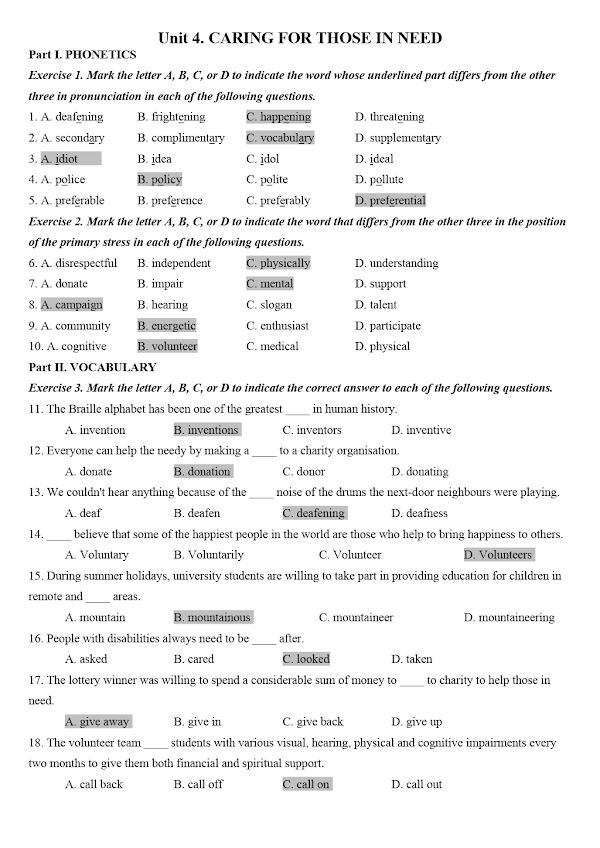Đề luyện thi THPTQG năm 2020 môn Tiếng Anh (có đáp án chi tiết)
Chào các bạn học sinh và quý thầy cô, hôm nay LogaVN gửi tới bạn đọc tài liệu "Đề luyện thi THPTQG năm 2020 môn Tiếng Anh (có đáp án chi tiết)". Hi vọng sẽ giúp ích cho các bạn học tập và giảng dạy.
ĐỀ DỰ ĐOÁN KÌ THI THPT QUỐC GIA NĂM 2020
Môn thi: TIẾNG ANH
Thời gian làm bài: 60 phút, không kể thời gian phát đề
Mark the letter A, B, C or D on your answer sheet to indicate the word whose underlined part differs from the other three in pronunciation in each of the following questions.
Question 1: A. hole B. home C. come D. hold
Question 2: A. watched B. cleaned C. stopped D. picked
Mark the letter A, B, C or D on your answer sheet to indicate the word that differs from the other three in the position of primary stress in each of the following questions.
Question 3: A. admit B. suggest C. remind D. manage
Question 4: A. approval B. applicant C. energy D. influence
Mark the letter A, B, C or D on your answer sheet to indicate the correct answer to each of the following questions.
Question 5: More and more investors are pouring ________ money into food and beverage start–ups.
A. the B. a C. an D. Ø
Question 6: Do you think there _____ less conflict in the world if all people spoke the same language?
A. were B. will be C. would be D. are
Question 7: Linda rarely goes to school by bike, but today she ______ a bike.
A. rides B. is riding C. is going to ride D. will ride
Question 8: John has worked very late at night these days, ______ he is physically exhausted.
A. yet B. hence C. because D. so
Question 9: I agree ______ one point with Chris: it will be hard for us to walk 80km.
A. in B. of C. on D. for
Đề ôn thi THPTQG môn Tiếng Anh (có lời giải chi tiết)
36 đề có Giáo án Power point (dạy online)
50 đề theo ma trận form minh họa
Các thầy cô và các e HS có nhu cầu liên hệ sđt 0865909502
Giá 150k/ cả bộ
Bộ đề chuẩn cấu trúc
ĐỀ SỐ 1ĐỀ DỰ ĐOÁN KÌ THI THPT QUỐC GIA NĂM 2020
Môn thi: TIẾNG ANH
Thời gian làm bài: 60 phút, không kể thời gian phát đề
Mark the letter A, B, C or D on your answer sheet to indicate the word whose underlined part differs from the other three in pronunciation in each of the following questions.
Question 1: A. hole B. home C. come D. hold
Question 2: A. watched B. cleaned C. stopped D. picked
Mark the letter A, B, C or D on your answer sheet to indicate the word that differs from the other three in the position of primary stress in each of the following questions.
Question 3: A. admit B. suggest C. remind D. manage
Question 4: A. approval B. applicant C. energy D. influence
Mark the letter A, B, C or D on your answer sheet to indicate the correct answer to each of the following questions.
Question 5: More and more investors are pouring ________ money into food and beverage start–ups.
A. the B. a C. an D. Ø
Question 6: Do you think there _____ less conflict in the world if all people spoke the same language?
A. were B. will be C. would be D. are
Question 7: Linda rarely goes to school by bike, but today she ______ a bike.
A. rides B. is riding C. is going to ride D. will ride
Question 8: John has worked very late at night these days, ______ he is physically exhausted.
A. yet B. hence C. because D. so
Question 9: I agree ______ one point with Chris: it will be hard for us to walk 80km.
A. in B. of C. on D. for
Question 10: ____________________, the ancient place is still popular with modern tourists.
A. Building thousands of years ago B. It was built thousands of years ago
C. To have built thousands of years ago D. Built thousands of years ago
Question 11: Once ___________ in the UK, the book will definitely win a number of awards in regional book fairs.
A. is published B. having published C. published D. publishing
Question 12: Your hair needs _______. You’d better have it done tomorrow.
A. cut B. to cut C. being cut D. cutting
Question 13: He was pleased that things were going on _______.
A. satisfied B. satisfactorily C. satisfying D. satisfaction
Question 14: Although our opinions on many things ______, we still maintain a good relationship with each other.
A. differ B. receive C. maintain D. separate
Question 15: Daniel ______ a better understanding of Algebra than we do.
A. makes B. has C. takes D. gives
Question 16: The pointless war between the two countries left thousands of people dead and seriously _______.
A. injured B. wounded C. spoilt D. damaged
Question 17: Eager to be able to discuss my work _____ in French, I hired a tutor to help polish my language skills.
A. expressively B. articulately C. ambiguously D. understandably
Question 18: The sight of his pale face brought ________ to me how ill he really was.
A. place B. house C. life D. home
Mark the Letter A, B, C, or D on your answer sheet to indicate the word(s) OPPOSITE in meaning to the underlined word(s) in each of the following questions.
Question 19: In a study, more Asian students than American students hold a belief that a husband is obliged to tell his wife his whereabouts if he comes home late.
A. urged B. free C. required D. suggested
Question 20: Though I persuaded my boss to solve a very serious problem in the new management system, he just made light of it.
A. completely ignored B. treated as important C. disagreed with D. discovered by chance
Mark the Letter A, B, C, or D on your answer sheet to indicate the word(s) CLOSEST in meaning to the underlined word(s) in each of the following questions.
Question 21: Students from that university have conducted a survey to find out the most effective study habit.
A. organized B. delayed C. encouraged D. proposed
Question 22: Some operations may have to be halted unless more blood donors come forward to help.
A. offer B. claim C. attempt D. refuse
Mark the letter A, B, C, or D on your answer sheet to indicate the most suitable response to complete each of the following exchanges.
Question 23: Bill is talking to his colleague.
Bill: “_________, Jack?” – Jack: “Fine! I have just got a promotion.”
A. What happened B. What are you doing C. How are you doing D. How come
Question 24: Two students are talking in a new class.
Student 1: “Excuse me, is anybody sitting here?” – Student 2: “____________”
A. No, thanks. B. Yes, I am so glad.
C. Sorry, the seat is taken. D. Yes, yes. You can sit here.
Read the following passage and mark the letter A, B, C, or D on your answer sheet to indicate the correct word or phrase that best fits each of the numbered blanks.
Amy Tan was born on February 19, 1952 in Oakland, California. Tan grew up in Northern California, (25) _______ when her father and older brother both died from brain tumors in 1966, she moved with her mother and younger brother to Europe, where she attended high school in Montreux, Switzerland. She returned to the United States for college. After college, Tan worked as a language development consultant and as a corporate freelance writer. In 1985, she wrote the story "Rules of the Game" for a writing workshop, which laid the early (26) _______ for her first novel The Joy Luck Club. Published in 1989, the book explored the (27) _______ between Chinese women and their Chinese–American daughters, and became the longest–running New York Times bestseller for that year. The Joy Luck Club received numerous awards, including the Los Angeles Times Book Award. It has been translated into 25 languages, including Chinese, and was made into a major motion picture for (28) _______ Tan co–wrote the screenplay. Tan's other works have also been (29) ______ into several different forms of media.
Question 25: A. however B. moreover C. so D. but
Question 26: A. preparation B. base C. source D. foundation
Question 27: A. relate B. relative C. relationship D. relatively
Question 28: A. whom B. that C. what D. which
Question 29: A. adjoined B. adapted C. adjusted D. adopted
Read the following passage and mark the letter A, B, C, or D on your answer sheet to indicate the correct answer to each of the questions.
Newspapers and television news programs always seem to report about the bad things happening in society. However, there is a place where readers can find some good news. That place is the website called HappyNews. The man behind HappyNews is Byron Reese. Reese set up HappyNews because he thought other news sources were giving people an unbalanced view of the world. Reese said about HappyNews, “The news media gives you a distorted view of the world by exaggerating bad news, misery, and despair. We’re trying to balance out the scale.”
Not everyone agrees with Reese’s view, though. Many people think that news sources have a responsibility to provide news that is helpful to people. People need to know about issues or problems in today’s society. Then they are better able to make informed decisions about things that affect their daily lives. Reese said that HappyNews is not trying to stop people from learning about issues or problems. HappyNews is just trying to provide a balanced picture of today’s world.
By the end of its first month online, HappyNews had more than 70,000 unique readers. About 60 percent of those readers were women. Something else unique makes HappyNews different from any of the other news or information websites that are on the Internet. Unlike many other websites, HappyNews gets fan mail from its readers on a daily basis.
Question 30: Which of the following is the best title for this passage?
A. “Byron Reese Tells People How to Be Happy” B. “Good News for a Change”
C. “Newspapers vs. Online News” D. “Why Women Like HappyNews”
Question 31: How is HappyNews different than other news sources?
A. All of the stories are written by Reese. B. HappyNews does not exaggerate its stories.
C. Its stories are not about bad things. D. The website only has stories about women.
Question 32: The word “they” in paragraph 2 refers to _______.
A. sources B. problems C. people D. issues
Question 33: Why might some people NOT like HappyNews?
A. It doesn’t tell them about important issues or problems.
B. Reese’s stories are about misery and despair.
C. Some sources give a balanced view.
D. The stories are from around the world.
Question 34: What does “exaggerating” mean in this reading?
A. improving B. explaining C. editing D. worsening
Read the following passage and mark the letter A, B, C, or D on your answer sheet to indicate the correct answer to each of the questions.
No sooner had the first intrepid male aviators safely returned to Earth than it seemed that women, too, had been smitten by an urge to fly. From mere spectators, they became willing passengers and finally pilots in their own right, plotting their skills and daring line against the hazards of the air and the skepticism of their male counterparts. In doing so they enlarged the traditional bounds of a women's world, won for their sex a new sense of competence and achievement, and contributed handsomely to the progress of aviation.
But recognition of their abilities did not come easily. "Men do not believe us capable." The famed aviator Amelia Earhart once remarked to a friend. "Because we are women, seldom are we trusted to do an efficient job." Indeed old attitudes died hard: when Charles Lindbergh visited the Soviet Union in 1938 with his wife, Anne–herself a pilot and gifted proponent of aviation – he was astonished to discover both men and women flying in the Soviet Air Force.
Such conventional wisdom made it difficult for women to raise money for the up – to – date equipment they needed to compete on an equal basis with men. Yet they did compete, and often they triumphed finally despite the odds.
Ruth Law, whose 590 – mile flight from Chicago to Hornell, New York, set a new nonstop distance record in 1916, exemplified the resourcefulness and grit demanded of any woman who wanted to fly. And when she addressed the Aero Club of America after completing her historic journey, her plainspoken wordstestified to a universal human motivation that was unaffected by gender: "My flight was done with no expectation of reward," she declared, "just purely for the love of accomplishment."
Question 35: Which of the following is the best title for this passage?
A. A Long Flight B. Women in Aviation History
C. Dangers Faced by Pilots D. Women Spectators
Question 36: According to the passage, women pilots were successful in all of the following EXCEPT___.
A. challenging the conventional role of women B. contributing to the science of aviation
C. winning universal recognition from men D. building the confidence of women
Question 37: What can be inferred from the passage about the United States Air Force in 1938?
A. It had no women pilots. B. It gave pilots handsome salaries.
C. It had old planes that were in need of repair. D. It could not be trusted to do an efficient job.
Question 38: In their efforts to compete with men, early women pilots had difficulty in ______.
A. addressing clubs B. flying nonstop C. setting records D. raising money
Question 39: According to the passage, who said that flying was done with no expectation of reward?
A. Amelia Earhart B. Charles Lindbergh C. Anne Lindbergh D. Ruth Law
Question 40: The word ‘skepticism’ is closest in meaning to _______.
A. hatred B. doubt C. support D. surprise
Question 41: The word ‘addressed’ can be best replaced by ________.
A. mailed B. came back to C. spoke to D. consulted
Question 42: The word ‘counterparts’ refers to ________.
A. passengers B. pilots C. skills D. hazards
Mark the letter A, B, C or D on your answer sheet to indicate the underlined part that needs correction in each of the following questions.
Question 43: Some people say often that using cars is not so convenient as using motorbikes.
A. say often B. using cars C. so D. as using motorbikes
Question 44: They are having their house being painted by a construction company.
A. having B. their C. being painted D. construction
Question 45: Transgender people are denied the ability to join the armed forces due to discriminating policies implemented by the government.
A. Transgender B. are denied C. armed forces D. discriminating
Mark the letter A, B, C, or D on your answer sheet to indicate the sentence that is closest in meaning to each of the following questions.
Question 46: “I agree that I am narrow–minded,” said the manager.
A. The manager denied being narrow–minded.
B. The manager admitted being narrow–minded.
C. The manager refused to be narrow–minded.
D. The manager promised to be narrow–minded.
Question 47: A supermarket is more convenient than a shopping centre.
A. A shopping centre is not as convenient as a supermarket.
B. A shopping centre is more convenient than a supermarket.
C. A supermarket is not as convenient as a shopping centre.
D. A supermarket is as inconvenient as a shopping centre.
Question 48: It was a mistake for Tony to buy that house.
A. Tony couldn’t have bought that house.
B. Tony can’t have bought that house.
C. Tony needn’t have bought that house.
D. Tony shouldn’t have bought that house.
Mark the letter A, B, C, or D on your answer sheet to indicate the sentence that best combines each pair of sentences in the following questions.
Question 49: Julian dropped out of college after his first year. Now he regrets it.
A. Julian regrets not having dropped out of college after his first year.
B. Julian wishes he didn’t drop out of college after his first year.
C. If only Julian hadn’t dropped out of college after his first year.
D. Only if Julian had dropped out of college after his first year would he not regret it.
Question 50: Seth informed us of his retirement from the company. He did it when arriving at the meeting.
A. Only after his retiring from the company did Seth tell us about his arrival at the meeting.
B. Not until Seth said to us that he would leave the company did he turn up at the meeting.
C. Hardly had Seth notified us of his retiring from the company when he arrived at the meeting.
D. No sooner had Seth arrived at the meeting than we were told about his leaving the company.
HƯỚNG DẪN GIẢI CHI TIẾT
Question 1CQuestion 11CQuestion 21AQuestion 31CQuestion 41CQuestion 2BQuestion 12DQuestion 22AQuestion 32CQuestion 42BQuestion 3DQuestion 13BQuestion 23CQuestion 33AQuestion 43ÂQuestion 4AQuestion 14AQuestion 24CQuestion 34DQuestion 44CQuestion 5DQuestion 15BQuestion 25BQuestion 35BQuestion 45DQuestion 6CQuestion 16BQuestion 26DQuestion 36CQuestion 46BQuestion 7BQuestion 17BQuestion 27CQuestion 37AQuestion 47AQuestion 8DQuestion 18DQuestion 28DQuestion 38DQuestion 48DQuestion 9CQuestion 19BQuestion 29BQuestion 39DQuestion 49CQuestion 10DQuestion 20BQuestion 30BQuestion 40BQuestion 50D
Question 1. C
Kiến thức: Phát âm “o”
Giải thích:
A. hole /həʊl/ B. home /həʊm/
C. come /kʌm/ D. hold /həʊld/
Phần gạch chân đáp án C phát âm là /ʌ/, còn lại là /əʊ/.
Chọn C
Question 2. B
Kiến thức: Phát âm “ed”
Giải thích:
Cách phát âm đuôi “ed”:
+ Đuôi “ed” được phát âm là /id/ khi động từ có phát âm kết thúc là /t/ hay /d/
+ Đuôi “ed” được phát âm là /t/ khi động từ có phát âm kết thúc là /s/,/f/,/p/,/ʃ/,/tʃ/,/k/
+ Đuôi “ed” được phát âm là /d/ với các trường hợp còn lại
A. watched /wɒtʃt/ B. cleaned /kliːnd/
C. stopped /stɒpt/ D. picked /pɪkt/
Phần gạch chân đáp án B phát âm là /d/, còn lại là /t/.
Chọn B
Question 3. D
Kiến thức: Trọng âm từ có 2 âm tiết
Giải thích:
A. admit /ədˈmɪt/ B. suggest /səˈdʒest/
C. remind /rɪˈmaɪnd/ D. manage /ˈmænɪdʒ/
Trọng âm đáp án D vào âm tiết thứ nhất, còn lại rơi vào âm tiết thứ hai.
Chọn D
Question 4. A
Kiến thức: Trọng âm từ có 3 âm tiết
Giải thích:
A. approval /əˈpruːvl/ B. applicant /ˈæplɪkənt/
C. energy /ˈenədʒi/ D. influence /ˈɪnfluəns/
Trọng âm đáp án A vào âm tiết thứ nhất, còn lại vào âm tiết thứ hai.
Chọn A
Question 5. D
Kiến thức: Mạo từ
Giải thích:
money (tiền) => danh từ không đếm được => không dùng mạo từ
pour money into: đổ tiền vào
Tạm dịch: Nhiều nhà đầu tư đang đổ tiền vào khởi nghiệp đồ ăn và đồ uống.
Chọn D
Question 6. C
Kiến thức: Câu điều kiện loại 2
Giải thích:
Câu điều kiện loại 2 diễn tả điều không có thật trong hiện tại.
Cấu trúc: If + S + V(quá khứ), S + would/ could + V
Tạm dịch: Bạn có nghĩ rằng sẽ có ít tranh chấp trên thế giới nếu tất cả mọi người nói cùng một ngôn ngữ không?
Chọn C
Question 7. B
Kiến thức: Thì hiện tại tiếp diễn
Giải thích:
Thì hiện tại tiếp diễn có thể dùng để diễn tả sự việc có tính chất tạm thời, khác với thói quen hằng ngày.
Cấu trúc: S + am/ is/ are + V_ing
Tạm dịch: Linda hiếm khi đạp xe đi học, nhưng hôm nay cô ấy đạp xe.
Chọn B
Question 8. B
Kiến thức: Liên từ
Giải thích:
A. yet: nhưng B. hence: vậy nên (đứng sau dấu phẩy)
C. because: bởi vì D. so: vậy (trước “so” không có dấu phẩy)
Tạm dịch: John đã làm việc tới rất muộn những ngày này, vậy nên anh ấy kiệt sức về thể chất.
Chọn B
Question 9. C
Kiến thức: Giới từ
Giải thích:
agree with sb about/ on sth: đồng ý với ai về cái gì
agree on sth: đồng ý về việc gì
Tạm dịch: Tôi đồng ý một điểm với Chris: sẽ rất khó cho chúng ta khi đi bộ 80 km.
Chọn C
Question 10. D
Kiến thức: Rút gọn mệnh đề đồng ngữ
Giải thích:
Khi 2 mệnh đề cùng chủ ngữ (the ancient place – it), ta có thể:
– rút gọn 1 mệnh đề mang nghĩa bị động về dạng Ved/ V3
– rút gọn 1 mệnh đề mang nghĩa chủ động về dạng V_ing
Câu dầy đủ: The ancient place was built thousands of years ago, it is still popular with modern tourists.
The ancient place was built => Built
Tạm dịch: Được xây dựng từ nhiều năm trước, địa điểm cổ xưa vẫn nổi tiếng với những du khách hiện đại.
Chọn D
Question 11. C
Kiến thức: Rút gọn mệnh đề đồng ngữ
Giải thích:
Khi 2 mệnh đề cùng chủ ngữ (the book – it), ta có thể:
– rút gọn 1 mệnh đề mang nghĩa bị động về dạng Ved/ V3
– rút gọn 1 mệnh đề mang nghĩa chủ động về dạng V_ing
Câu đầy đủ: Once the book is published in the UK, it will definitely win a number of awards in regional book fairs.
Once the book is published => Once published
Tạm dịch: Một khi được xuất bản ở UK, cuốn sách chắc chắn sẽ thắng nhiều giải thưởng.
Chọn C
Question 12. D
Kiến thức: V–ing/ to V
Giải thích:
need Ving = need to be P2: cần được làm gì
need + to V: cần làm gì
Tạm dịch: Tóc của bạn cần được cắt. Bạn nên làm nó vào ngày mai.
Chọn D
Question 13. B
Kiến thức: Từ loại
Giải thích:
A. satisfied (adj): hài lòng B. satisfactorily (adv): một cách hài lòng
C. satisfying (v–ing): hài lòng D. satisfaction (n): sự hài lòng
Sau động từ “going on” ta cần một trạng từ theo sau.
Tạm dịch: Anh ấy hài lòng với việc mọi thứ tiến triển tốt.
Chọn B
Question 14. A
Kiến thức: Từ vựng
Giải thích:
A. differ (v): khác nhau, khác biệt B. receive (v): nhận
C. maintain (v): duy trì D. separate (v): chia tách
Tạm dịch: Mặc dù ý kiến của chúng tôi về nhiều thứ khác nhau, chúng tôi vẫn duy trì mối quan hệ tốt với nhau.
Chọn A
Question 15. B
Kiến thức: Cụm từ
Giải thích: have an understanding of: có kiến thức về, hiểu biết về…
Tạm dịch: Daniel có hiểu biết về Algebra hơn chúng ta.
Chọn B
Question 16. B
Kiến thức: Từ vựng
Giải thích:
A. injured (adj): bị thương B. wounded (adj): bị thương (do vũ khí)
C. spoilt (adj): hư hỏng (trẻ con) D. damaged (adj): bị phá huỷ
Tạm dịch: Cuộc chiến tranh vô nghĩa giữa 2 đất nước đã khiến hàng nghìn người chết và bị thương.
Chọn B
Question 17. B
Kiến thức: Từ vựng
Giải thích:
A. expressively (adv): truyền cảm B. articulately (adv): rõ ràng, rà

